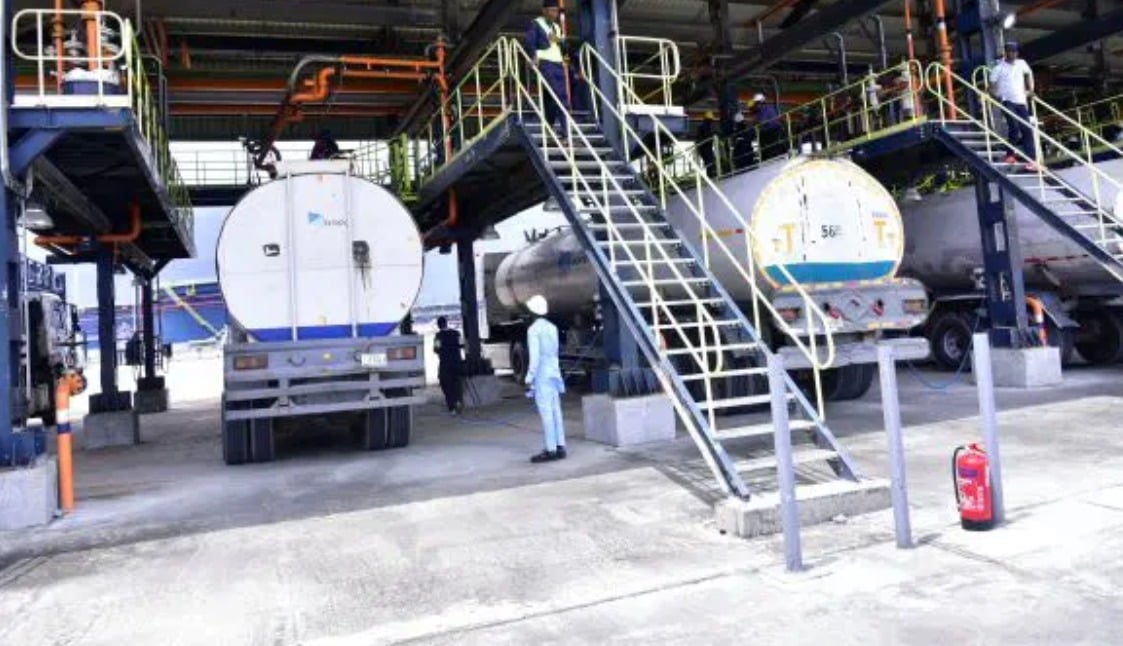The Dangote Refinery is expected to begin producing crude oil before the end of 2025, marking a major step forward for Nigeria’s energy sector, according to a new report by S&P Global.
The report stated that Dangote’s upstream oil assets, Oil Mining Leases (OML) 71 and 72, located in the Niger Delta, are scheduled to start pumping about 40,000 barrels of crude oil per day.
“Dangote’s upstream assets in the Niger Delta, Oil Mining Lease 71 and 72, could soon provide another supply injection, with production expected to start this month and reach up to 40,000 barrels per day,” the report said.
This development is seen as a key milestone in resolving crude supply constraints that have affected the $20bn, 650,000-barrel-per-day refinery located in Lekki, Lagos.
New Crude Supply Deal with NNPC
The report also confirmed that the Nigerian National Petroleum Company Limited (NNPC) has signed a new two-year crude supply agreement with the Dangote Refinery to ensure consistent feedstock availability.
The partnership follows President Bola Tinubu’s directive last year for the implementation of a “naira-for-crude” swap deal, which allows NNPC to supply crude oil to the Dangote Refinery in exchange for refined products like petrol and diesel.
Under the swap arrangement, NNPC supplies 14 crude oil cargoes or their equivalent value in dollars, while Dangote delivers the same quantity of refined fuel products in naira.
This deal is part of efforts by the government to stabilise fuel supply, strengthen local refining, and reduce dependence on imported petroleum products.
Alleviating Crude Shortage Challenges
The S&P Global report noted that the agreement between NNPC and Dangote has helped to ease the refinery’s crude supply challenges, which had previously slowed production levels.
Early in 2025, the refinery faced delays in sourcing local crude due to pricing disagreements with oil producers, forcing it to import feedstock from the United States and other countries.
Despite these hurdles, the refinery continued operations at reduced capacity, producing diesel, aviation fuel, and other refined products for local consumption and export.
The start of Dangote’s crude production from OMLs 71 and 72 is expected to significantly boost refinery operations and increase fuel availability across Nigeria.
Dangote’s Upstream Expansion Drive
The Group President of Dangote Industries Limited, Alhaji Aliko Dangote, has reportedly shown interest in expanding the company’s upstream oil portfolio as part of a broader strategy to secure self-sufficiency in crude supply.
Industry analysts believe that producing its own crude oil will reduce the refinery’s dependence on external suppliers and lower feedstock costs.
“Dangote remains committed to growing upstream operations to support its refining business and ensure steady domestic energy supply,” a source familiar with the company’s plans said.
Boost for Nigeria’s Energy Security
Analysts have welcomed the news as a positive development for Nigeria’s energy independence. The Dangote Refinery, once fully operational, is projected to meet Nigeria’s entire fuel demand and export surplus products to other African markets.
The refinery’s operation aligns with the Federal Government’s agenda to end fuel importation, save foreign exchange, and create thousands of direct and indirect jobs.
The expected start of crude production could also help stabilise domestic fuel prices and improve supply consistency across the country.
The refinery project, commissioned in May 2023, is considered one of Africa’s largest industrial investments. Its completion and integration with upstream production mark a new chapter in Nigeria’s quest for self-reliance in the oil and gas sector.
Conclusion
As Dangote’s upstream production begins, the synergy between local crude supply and refining is expected to enhance Nigeria’s energy balance, reduce reliance on foreign imports, and strengthen the country’s economic resilience.
